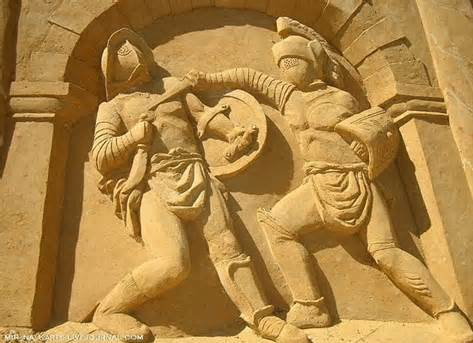
Out of Germanic you have North Germanic
從日耳曼語系衍生出來的有北日耳曼語系
you get all your Northern languages
由此將衍生出所有的北歐語種
out of the other branch you'd get west Germanic
另外一個分支是西日耳曼語系
Which subdivides into one branch, Celtic and German
西日耳曼語系細(xì)化出一個分支,并衍生在凱爾特語和德語
And on another branch you'll get English and Dutch
另一個細(xì)化的分支則衍生出英語和荷蘭語
And these groups so kind of wander out in different times
這些語系在不同時期的使用看上去顯得有些混亂
There's a great book in the 70's or late 60's
在七十年代或者六十年代末期有一本寫得很好的書
if you like these kind of stuff
如果你喜歡鉆研這方面的內(nèi)容
It's called Atlantis
不妨看一下,書的名字叫做亞特蘭蒂斯
In the theory of Atlantis is the same idea, that there was an advanced civilization
亞特蘭蒂斯闡述了一個類似的觀點(diǎn),那就是曾經(jīng)有一段先進(jìn)的文明
in all culture from the whole world comes from this one advance civilization
之后世間所有的文化都是源自這段先進(jìn)的文明
and the particular case of Atlantis it what?
至于這段叫做亞特蘭蒂斯的文明究竟是什么樣子
It sank they're still looking for Atlantis
據(jù)說他沉到了海底,世人至今仍在搜尋他的蹤跡
I think they found Atlantis off Egypt some place on Mediterranean
我聽說他們最近似乎在埃及附近找到了亞特蘭蒂斯,也就是地中海的某個地方
and people set out in boats in different directions taking remnants of culture as they remember it
研究人員從不同方向開出打撈船,找到了他們所認(rèn)得的文化與語言的殘留物
The first of these groups to emerge was of course the Greek world that is Europe
這些文化之中首先出現(xiàn)的自然是曾今遍及歐羅巴的希臘語世界
it emerged what 900 B C to 500 B C
它產(chǎn)生于公元前900年到公元前500年前后
It went to the state of being Barbarians
然后希臘文明傳播到了野蠻人的土地
the modern meaning of Barbarians is what we're all Barbarians
其實(shí)我們都是所謂的野蠻人
the technical meaning of the word Barbarian is they don't speak Latin or Greek
因?yàn)锽arbarian這個詞的原始含義就是指,不說拉丁語和希臘語的人
But we use that word in a general sense
而如今我們則更廣泛的使用了這個詞
so they went from 900 B C TO 500 B C
希臘文明從公元前900年發(fā)展到公元前500年前后
They went from having knowing nothing to the peak of their civilization
他們從一無所知,發(fā)展到了他們文明的頂峰
Next the Roman world comes in and by 146 B C
之后的羅馬帝國時期在公元前146年左右出現(xiàn)
that's probably on your dates, it's on your chart
這在紀(jì)年表上有,公元前146年,這在你們的表上有
The Greeks have been conquered by the Romans and the Romans on what we've talked about last time
希臘人已經(jīng)被羅馬人征服羅馬人,正如我們上次所說的
They absorb what they like the Greek intellectual life and culture
他們吸收了他們所認(rèn)為的希臘文化的精髓
Roman Empire 31 B C to the latter part of the century
羅馬帝國,公元前31年,來到世紀(jì)的后半葉
Important things about the Roman Empire
關(guān)于羅馬帝國的一些重要的內(nèi)容
political unity, internal peace, government, cities grew things you're all familiar with
政治統(tǒng)一,內(nèi)部和平,政府,城市發(fā)展都是些你們所熟悉的知識
This term though, when I use the term Europe
注意雖然我用了歐羅巴這個詞
The term Europe had really had very little meaning for the Romans which is scarcely used by them
但其實(shí)這個詞在那時并沒有什么意義對于羅馬人,他們很少使用這個名詞
It's really in the half millennium, from the 5th and 10th century that Europe as we think of Europe
直到千禧年的半程,從五世紀(jì)到十世紀(jì),歐羅巴,才是我們所熟知的歐洲
for the first time emerged with its peoples brought together in the life of their own clearly set off from Africa and Asia
才第一次逐漸浮現(xiàn),歐洲的人民開始共同生活,開始清楚地與非洲亞洲人的生活產(chǎn)生分化
The first requirement was that the Roman Empires
而這一切的起因最關(guān)鍵的就是羅馬帝國的瓦解
Disintegrate, go to pieces in the West
這其中西羅馬帝國徹底衰落,土崩瓦解











